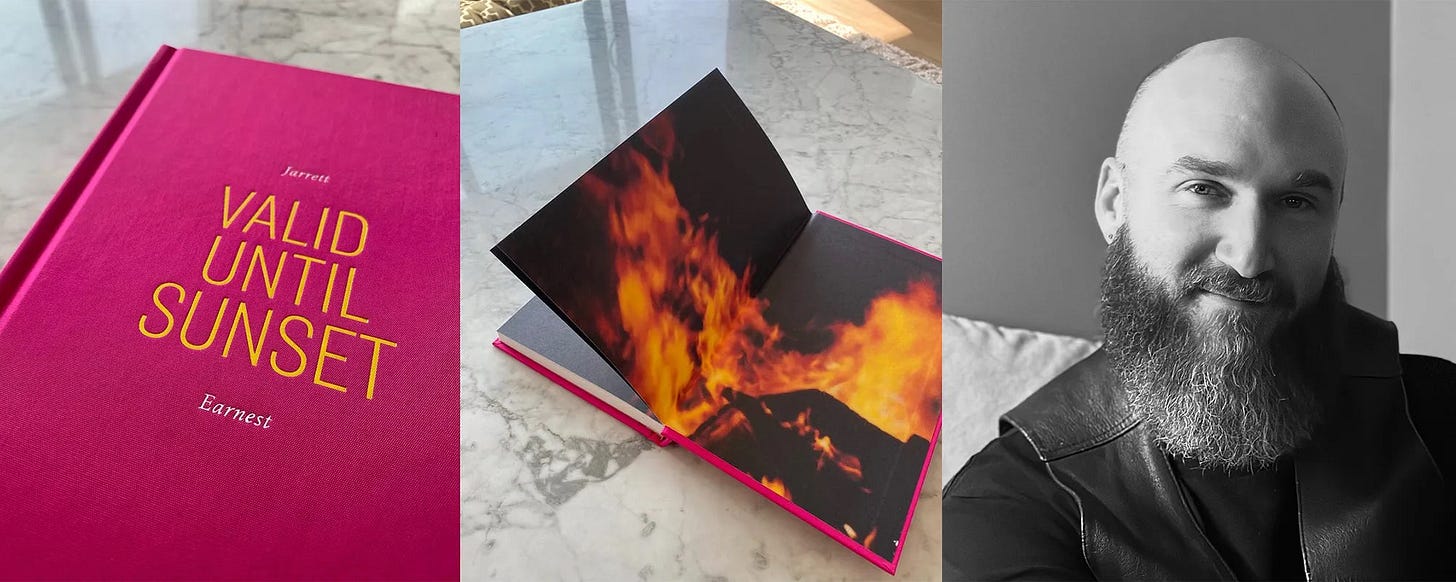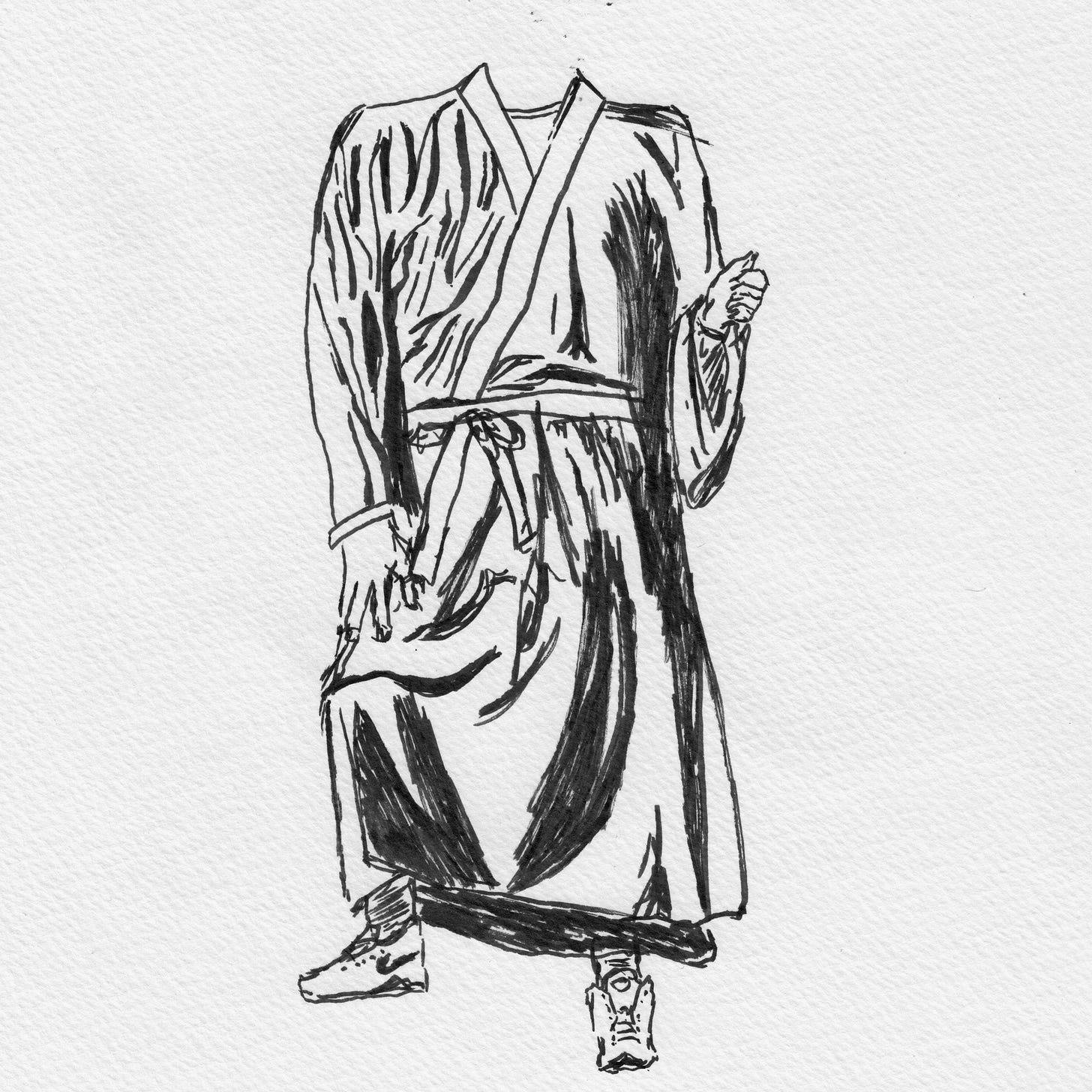Transient, not Ephemeral
New podcast with Jarrett Earnest, my onco-update, & Leonard Cohen's drapes
Podcastery
This week, I posted Episode 567 of The Virtual Memories Show, feat. the last guest-episode of 2023! Art critic Jarrett Earnest joins me to celebrate his beautiful new book, VALID UNTIL SUNSET (Matte Editions), which brings together his Polaroids and a second-person narrative to create a bewitching trip through memory, art, grief, friendship, and more. We talk about how the sudden death of his father paralyzed and then catalyzed him, the importance of making art before fully recovering from a bad experience, how the artist’s job is to be a question mark, and how a Nan Goldin exhibition started him on taking pictures of the people and places that mattered to him. We get into his friendships with Genesis P-Orridge and Peter Schjeldahl, and Genesis’ imprecation to do/make/be the Most Fabulous Imaginable Version, the importance of road trips and pilgrimages, what he learned from interviewing a series of art critics, the freedom & addictiveness of writing in the second person, why we need to make an argument about why any art matters at all today, and why he loves writing about artists he knows. Plus, we discuss the value of public-facing life in NYC, the importance of having a really good analyst and really dumb personal trainer, why you don’t need to be part of Barbenheimer, and a lot more. Give it a listen! And go read Valid Until Sunset
This week, I posted Episode 566 of The Virtual Memories Show, feat. poet Christian Wiman as we celebrate his amazing new book, ZERO AT THE BONE: Fifty Entries Against Despair (FSG), a fusion of essay, poem, memoir and anthology that explores how the act of writing a poem is a gesture of faith. We talk about the varieties of despair and joy, the question of whether the world is governed by chaos or order, and whether the relationship between art and life is a tension or antipathy. We also get into the urgency of mortality and the rare cancer that almost killed Christian on three separate occasions, the notion of having a calling and the difference between given and earned callings, who we’re really trying to reach when we write a poem, whether Philip Larkin’s Aubade is a poem of pure despair, and what he’s learned from teaching at Yale Divinity School. We also discuss The Void & how to tune it out, his thoughts on faith and Christ and how the incarnation of God in Jesus sacralizes the physical world, where poetry began for him, whether joy is passed down epigenetically like trauma (allegedly) is, coming around on poets in translation like Yehuda Amichai, the meaning of existence, and a lot more (I mean, if you can have a lot more after the meaning of existence). Give it a listen! And go read Zero At The Bone
Recent episodes: Danny Fingeroth • Matt Bors • Phillip Lopate • Leslie Stein • Josh Bayer • Adam Sisman
(White) Blood (Cells) Will Out
When a podcasting pal recently asked me whether changes at twitter had affected my audience-download numbers, I reminded him that, ever since my CLL diagnosis in mid-2021, the only number that matters to me is my white blood cell count. “You don’t even look?” “I don’t even care.” [Since then, I quit twitter.]
I went to my 6-month oncology check-in on Monday, and it was . . . okay. My WBC is up, but not so drastically that they need to start treatment. (The practice is that if WBC doubles in a 6-month span, then the disease is getting out of control and they should start treatment; this one was up ~40%.) Still, they want to move me up to a 3-month interval to see if yesterday’s jump is an outlier or if I’m heading in a bad direction. Some of the secondary results also were trending . . . not-so-great.
I’m fine in terms of energy, adding occasional 6+-mile runs to 5 days a week of weights/yoga workouts, and finding the time for all the other stuff you’ve come to know, love, resent, etc.: podcast, newsletter, reading, a little art-making, all overshadowed by that heavy-ass day job/career I always allude to.
But Monday’s results left me in a crisis of faith. Or it helped crystallize the crisis that’s been ongoing much of this year. I don’t want to go into it too much, for a variety of reasons, but the “why bother?” vibes have been strong, offsetting the “Gil feels a responsibility to produce something virtually no one listens to or reads, and acts like it’s his sacred duty” vibes. [Along those lines, both of those podcasts above form a really good through-line for What This Year’s Been Like; I hope you’ll listen to them.]
Which I wrote about to a pal who’s in my boat — diagnosed w/CLL at 50 (a few years older than me), experienced with the semiannual check-ins & their unexplainable fluctuating results, the thrown-ness of pre-check-in anxiety, the way it compels you to evaluate your life and what you’ll do if your number’s up, as it were — and he shared his experiences with me. We’re dealing with our situations differently, but it helped to know that someone — an artist, to boot — understands from the inside. It also helps that CLL is over-represented in Ashkenazi Jews, because we have a shared sense of anxiety & neurosis about everydamnthing.
That same day, I got the weekly email from the CLL Society, “a patient–centric, physician–curated nonprofit organization focused on patient education, support, and research”. There was a bit about the co-founder’s blog, and on a whim I decided to check that out. The most recent entry, reflecting on the impact of his work even when some of the initiatives didn’t last — like a COVID protocol for CLL/SLL patients that took a lot of work but didn’t survive more recent mutations by the virus — struck a chord with me:
The bigger question is: Does short or long even matter when making an impact? Maybe not. Not lasting doesn’t mean it is not worthwhile. I think a positive impact does change the world in a way that can’t be fully understood. Quoting another Greek: “You can’t step into the same river twice.” It’s the impact, not its durability, that counts. Though it may be transient, it is not ephemeral. It is fixing the world [that] matters, even if it’s only a temporary fix for a minority of those with an orphan cancer, such as CLL / SLL. Switching from Greek to Aramaic, Rabbi Tarfon says in the Talmud: “It is not your duty to finish the work, but neither are you at liberty to neglect it.”
Astute/stalker-y readers will recall I cited that same line of Rabbi Tarfon a couple of weeks ago, but that’s not why this resonated with me. It’s because that whole paragraph is what I have to believe to keep going.
I’d go on, but I have to get back to work.
Art
Didn’t give myself time to make any real art last week; sorry! After taking a blow to the head on Wednesday evening, I did spend some time experimenting with a fine brush-pen & a photo of Leonard Cohen in his prayer-robes. I made a terrible pencil drawing of this once, & thought I’d see how I could just work on some of the drapery with this tool. Came out super-stylized. I gained a new paying subscriber this week, so I need to make a postcard drawing/painting for them. You should go to the Flickr album of most of the art I’ve made & find something you like.
Until Next Time
Thanks for reading this far! I’ll be back on Sunday with links, books, & workout craziness, and Wednesday with a new episode, maybe some art, & who knows maybe a little profundity or something.
Give me a Leonard Cohen afterlife / So I can sigh eternally,
—Gil Roth
Virtual Memories
Bluesky • Instagram • Flickr • YouTube • Linktr.ee
(I deactivated my Twitter acct., so don’t look for me there)


